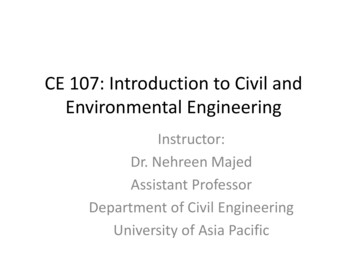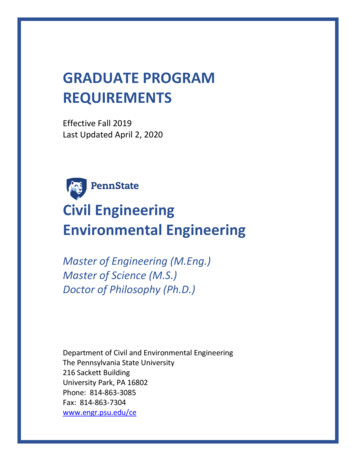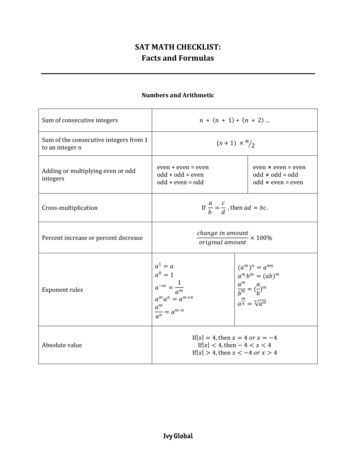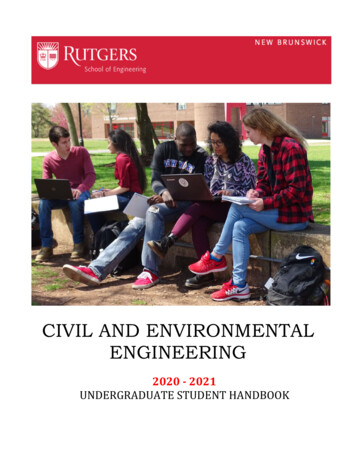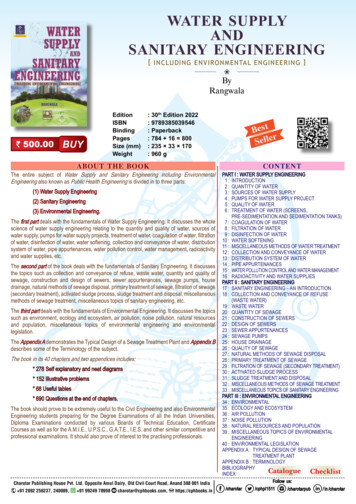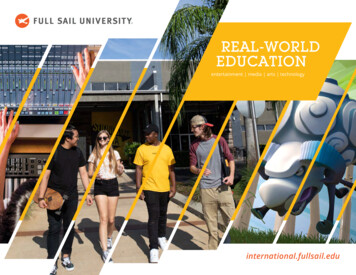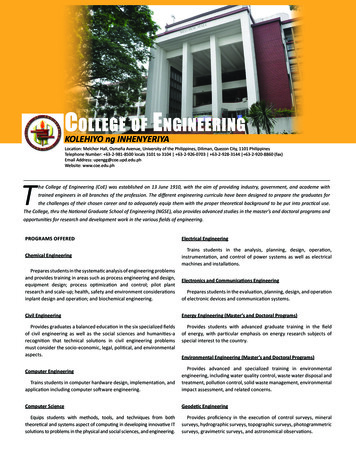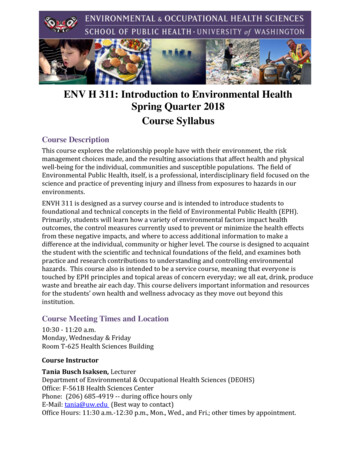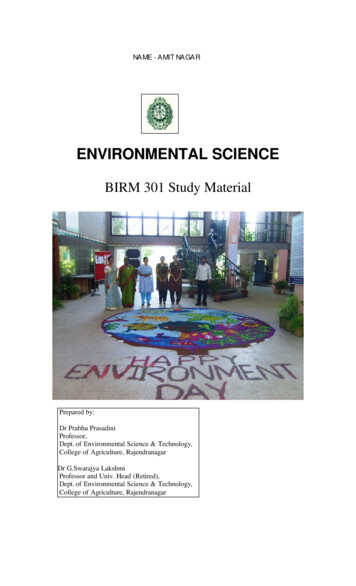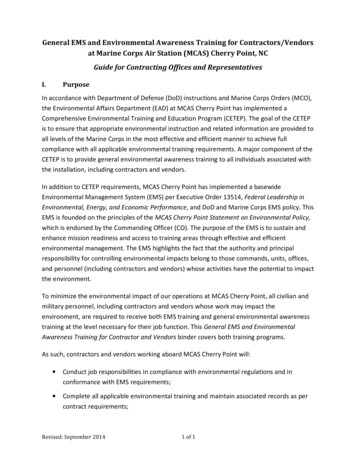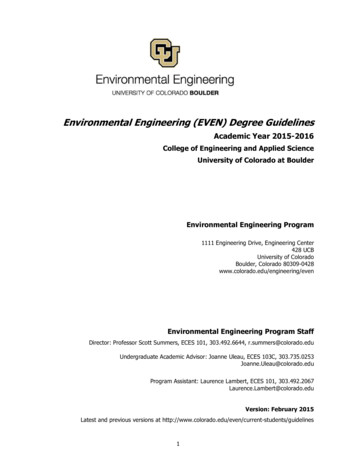
Transcription
Environmental Engineering (EVEN) Degree GuidelinesAcademic Year 2015-2016College of Engineering and Applied ScienceUniversity of Colorado at BoulderEnvironmental Engineering Program1111 Engineering Drive, Engineering Center428 UCBUniversity of ColoradoBoulder, Colorado mental Engineering Program StaffDirector: Professor Scott Summers, ECES 101, 303.492.6644, r.summers@colorado.eduUndergraduate Academic Advisor: Joanne Uleau, ECES 103C, 303.735.0253Joanne.Uleau@colorado.eduProgram Assistant: Laurence Lambert, ECES 101, 303.492.2067Laurence.Lambert@colorado.eduVersion: February 2015Latest and previous versions at elines1
Contents1. Overview of Guidelines and Introduction to Environmental Engineering1.1. Overview of Environmental Engineering . 31.2. History of the Environmental Engineering Program. 31.3. Mission and Educational Objectives . 41.4. Program Outcomes . 42. Environmental Engineering Degree Programs2.1. Bachelor of Science in Environmental Engineering (EVEN BS). 52.2. EVEN Options . 82.3. Dual Degrees . 102.4. Concurrent Bachelor of Science/Master of Science Degree (EVEN BS/CVEN MS). 102.5. Certificate Programs and Minors . 113. Advising3.1. Advising Process . 113.2. Program Contact with Students (Email) . 123.3. Academic Records . 123.4. Additional Advising Resources . 123.5. Faculty Advisor Assignments . 124. Academic Policies4.1. Prerequisite and Co-Requisite Courses. 134.2. Transfer Credit . 134.3. Humanities and Social Sciences Electives (including communication/writing requirement). 154.4. Technical Electives . 174.5. Free Electives . 184.6. Air or Earth Sciences Laboratory or Field Course . 184.7. Independent Study . 194.8. Senior Thesis . 194.9. Engineering Co-op Program . 204.10. Petitions . 204.11. Academic Honesty . 205. Graduation Requirements5.1. Requirements for EVEN BS Degree . 215.2. Fundamentals of Engineering Examination . 225.3. Requirements for Dual Degrees . 236. Society of Environmental Engineers (SEVEN) . 237. Faculty Directory . 24Forms and Appendices . 26Technical Electives Suggestions . 27Useful Websites . 32Degree Requirements Worksheet for EVEN BS Degree . 33EVEN B.S. Degree block diagrams . 352
1. Overview of Guidelines and Introduction to Environmental EngineeringThe Environmental Engineering (EVEN) Degree Guidelines provide an outline of the curriculum and policies of theEnvironmental Engineering (EVEN) degrees offered by the College of Engineering and Applied Science of the University ofColorado at Boulder. These guidelines are written primarily for students and Faculty Advisors of the EnvironmentalEngineering Program. The current version of these Guidelines and versions dating back to the beginning of the Programin 1998 are kept on the Program’s web site delines).General policy information for students is also available from the Office of Student Services in the Dean’s Office of theCollege of Engineering and Applied Science icies) and in theUniversity of Colorado at Boulder Catalog (http://www.colorado.edu/catalog/). Further information on academic supportprograms, is available at ort.Information on courses offered, including course descriptions, is available in the University Catalog. The course schedulefor each semester is available to CU students through the MyCUInfo portal (http://mycuinfo.colorado.edu). A .pdf file ofcourse listings, alphabetical by college and department, can be found on the Continuing Education Access site:http://conted.colorado.edu/programs/access/ (This document is not updated past its “publication date”, however, socheck the online schedule for the most recent information.)1.1. Overview of Environmental EngineeringEnvironmental engineers play a vital role in maintaining the quality ofboth human environmental systems and the natural environment.Environmental engineering encompasses the scientific assessment anddevelopment of engineering solutions to environmental problemsimpacting the biosphere, land, water, and air quality. Environmentalissues affect almost all commercial and industrial sectors, and are acentral concern for the public, for all levels of government, and ininternational relations. These issues include safe drinking water,wastewater processing, solid and hazardous waste disposal, outdoor airpollution, indoor air pollution and transfer of infectious diseases, humanhealth and ecological risk management, prevention of pollution throughproduct or process design, and renewable and sustainable energysources and their effects on the environment.To address these challenges, environmental engineers often encounterchallenging problems that must be solved in data-poor situations asThe Engineering Center at the University ofmembers of multidisciplinary teams. Environmental problems requireColorado at Bouldercreative solutions with contributions from scientists, lawyers, businesspeople, and the public. Good communication skills, as well as technical proficiency, are essential for success in this arena.In addition, technology designed to address environmental problems is marketed globally, opening up increasingopportunities for international work in the environmental engineering field.1.2. History of the Environmental Engineering ProgramThe Environmental Engineering Program at the University of Colorado at Boulder originated with a college-wide facultycommittee that met during the 1993-1994 academic year to develop a multi-disciplinary curriculum for a Bachelor ofScience degree in Environmental Engineering. The committee was headed by Prof. John Daily of Mechanical Engineering.The degree program was intended to supplement environmental engineering options that were offered through theDepartments of Chemical and Biological Engineering and Civil, Environmental, and Architectural Engineering (theDepartment of Mechanical Engineering now offers an environmental engineering option as well).The initiative to develop the EVEN BS degree and the Environmental Engineering Program to administer the degree wasmotivated by recognition that (1) environmental engineering had matured into a full-fledged discipline of its own and(2) environmental engineering intersected with the traditional disciplines of chemical, civil, and mechanical engineering,but was not adequately covered by any single discipline. The faculty committee decided that students intending towork in environmental engineering would benefit from a curriculum that focused on environmental engineering andrelated courses regardless of which department offered those courses. At the same time, the existing environmentalengineering options could be retained in the departments for students who were interested in environmentalengineering but wanted to pursue traditional chemical, civil, or mechanical engineering degrees.3
The proposed EVEN BS degree program was approved by the faculty of the College of Engineering and Applied Sciencein the spring of 1994. The faculty committee then prepared a full proposal for the new degree program for the ColoradoCommission on Higher Education (CCHE), and the new EVEN BS degree program was approved in the spring of 1998.The first Director of the Environmental Engineering Program was Prof. Jana Milford of Mechanical Engineering. Studentsbegan entering the program in the fall of 1998. The first degree was awarded in December 1999 (to a student whotransferred into the program as a third-year student).In approving the new degree, CCHE relied on the College's intent to deliver the EVEN BS degree using existing coursesand faculty. To this end, the program is administered by the College, and operates through the participation of affiliatedfaculty from Aerospace Engineering Sciences, Chemical and Biological Engineering, Civil, Environmental, and ArchitecturalEngineering, and Mechanical Engineering. The College provides support for a faculty Director, an Academic Advisor,administrative support, and teaching support for courses to supplement the EVEN curriculum. The four departments thatparticipate in the program are committed to regularly offering the courses that comprise the EVEN curriculum,coordinating to avoid scheduling conflicts, and sharing academicadvising and other faculty service requirements.During the 2002-2003 academic year, the EnvironmentalEngineering Program applied for accreditation of the EVEN BSdegree with the Engineering Accreditation Commission of ABET(Accreditation Board of Engineering and Technology,http://www.abet.org). The ABET examiners were thoroughlysatisfied with the EVEN BS degree and ABET granted accreditationto the degree in September 2003. The Environmental EngineeringProgram completed the first major revision of the EVEN curriculumfor the 2004-2005 academic year, and was re-accredited in 2006and 2012.1.3. Mission and Educational ObjectivesThe EVEN faculty, its Professional Advisory Board (representingprospective employers of our graduates), and EVEN alumni andcurrent students have contributed to the creation of the Program’smission and the educational objectives of the EVEN BS degree.EVEN students on a field trip for the CVEN 3434 Introductionto Applied Ecology course with Professor Diane McKnight.The mission of the Environmental Engineering Program is to provide a multidisciplinary undergraduate environmentalengineering education that emphasizes mastery of principles and practices, inspires service for the global public good,endows a desire for life-long learning, and prepares students for broad and dynamic career paths in environmentalengineering.The educational objectives of the EVEN BS degree are to produce students who reach the following achievementsthree to five years after graduation:1. EVEN graduates have become established in professional careers and/or earned advanced degrees;2. EVEN graduates have applied multidisciplinary approaches to manage the unique challenges and balance thecompeting social, political, economic, and technical goals of environmental problems and solutions; and3. EVEN graduates have served the needs of our society and protected the future of our planet in an ethical manner.1.4. Program OutcomesA list of program outcomes for EVEN graduates was developed that satisfies the requirements of ABET in the Criteria forAccrediting Engineering Programs for general engineering programs (ABET Criterion 3) and for environmental engineeringprograms as developed by the American Academy of Environmental Engineers (AAEE) and cooperating societies. Asdefined by ABET, outcomes are “statements that describe what students are expected to know and are able to do by thetime of graduation” (ABET, 2010).11ABET Engineering Accreditation Commission, Criteria for Accrediting Engineering Programs: Effective for Evaluations During the 2011-2012Accreditation Cycle, Baltimore, MD, 2010.4
The outcomes that students are expected to have attained upon graduation with a Bachelor of Science degree inenvironmental engineering are:the ability to apply knowledge of math, science and engineering the ability to design and conduct experiments the ability to analyze and interpret data the ability to design a system, component or process to meet desired needswithin realistic constraints the ability to function on multidisciplinary teams the ability to identify, formulate and solve engineering problems an understanding of professional and ethical responsibility the ability to communicate effectively through writing the ability to communicate effectively through oral presentations an understanding of the impact of engineering on society a recognition of the need for and an ability to engage in life-long learning a knowledge of contemporary issues in environmental engineering the ability to use modern engineering techniques, skills and toolsOutcomes The curriculum that has been developed and the content of those courses help to ensure that the EnvironmentalEngineering Program satisfies these outcome goals. Extracurricular activities, internships, co-ops and participation inresearch also contribute to satisfying these goals. Evaluation of courses and surveys of graduating seniors and alumnihelp us to document that the EVEN Program successfully achieves these outcomes. Student performance on theFundamentals of Engineering (FE) exam also documents our success. Review of course syllabi and student work byfaculty and the Advisory Board ensures on-going evaluation and improvement of our curriculum to best serve ourstudents and the Environmental Engineering profession.2. Environmental Engineering Degree Programs2.1. Bachelor of Science Degree in Environmental Engineering2.1.1. Overview of EVEN BS DegreeThe Bachelor of Science degree in Environmental Engineering at the University of Colorado provides preparation forprofessional proficiency or graduate training in environmental engineering in a four-year curriculum.The curriculum includes courses in engineering fundamentals and applications, advanced mathematics, chemistry,physics, biology, and earth science, as well as the arts, humanities and social sciences. Courses specific to environmentalengineering practice include water chemistry, microbiology, and air pollution control. In addition, environmentalengineering requires hands-on laboratory experiences, up-to-date skills in the use of computers for modeling and dataanalysis, and experience in the design of environmental engineering systems. Many of the required engineering courses inthe Bachelor of Science curriculum are delivered by the departments of Chemical and Biological Engineering, Civil,Environmental, and Architectural Engineering, and Mechanical Engineering. The curriculum also includes three Optioncourses, three technical elective courses and a free elective. The three Option courses represent an area of specializationin environmental engineering selected by the student beginning in the third year. The curriculum includes seven sets ofprescribed Option courses in these areas of specialization:Air QualityEnvironmental RemediationChemical ProcessingEngineering for Developing CommunitiesEnergy Conversion FundamentalsApplied EcologyWater Resources and Treatment5
In addition to these prescribed Options, students may also formulate their own sequence of Option courses (referred toas a “Special Option”) representing an area of specialization not included in the Options listed above. This selection mustbe approved through petition to the Environmental Engineering Program. Examples of special option topics includeEnergy and Industrial Monitoring, and Remediation and Ecology.Students in the program are also encouraged to participate in research through independent study projects, a seniorthesis, the Undergraduate Research Opportunities Program (UROP), the Discovery Learning Apprenticeship ning/discovery.htm), or as undergraduate research assistants in sponsoredresearch programs.2.1.2. Curriculum for EVEN BS DegreeThe following section contains the curriculum table for the EVEN BS degree. The curriculum represents a “contract” ofsorts with incoming students – for students entering the program during the current academic year, completion ofthis curriculum with a satisfactory grade point average is the requirement for graduation. The curriculum alsorepresents a guarantee that the courses listed (or acceptable substitutes) will be available in the semesters listed.The curriculum is somewhat dynamic despite its contractual nature. Minor changes may be made by the Program duringthe academic year, and major changes may be made between academic years. To meet graduation requirements,students are expected to follow the curriculum in effect for the academic year that they matriculated into the program;therefore, students should keep a copy of the Environmental Engineering (EVEN) Degree Guidelines for that year. Anarchive of the Guidelines is retained on the program’s web site elines). Students may elect to follow a later curriculum revision with program approval; however, studentsmay not elect to follow a curriculum in effect before they started the program, and may not combine curricula fordifferent years.The curriculum below shows the recommended sequence of courses. Courses marked with an asterisk (*) are offeredonly in the semester shown (fall or spring). Other courses are offered in both semesters, and sometimes in the summer.Students may take courses in terms other than those shown, but must be careful to meet prerequisites or co-requisitesfor each course. The air or earth sciences lab or field course and the free elective (both listed in the fourth year) may betaken in any semester.Many of the required courses in the EVEN BS curriculum (solid mechanics, engineering economics, fluid mechanics,thermodynamics, heat transfer, probability and statistics) may be satisfied by courses from various engineeringdepartments. Students may choose a course from any of the approved options for each requirement; however, studentsshould evaluate these choices carefully depending on their major interest in environmental engineering. For example, astudent interested in the Air Quality Option would want to take the Mechanical Engineering courses for solid mechanics,fluid mechanics, thermodynamics, and heat transfer. A student interested in the Chemical Processing Option wouldchoose chemical engineering (CHEN) courses. Sometimes a specific version of a course is required for a certain option.For certain courses in the EVEN BS degree curriculum, students may encounter questions about prerequisite and corequisite course requirements not being met. If students are following the recommended curriculum sequence there isno need for concern; the Environmental Engineering Program has consulted in detail with the departments and facultyoffering these courses to ensure that the sequence of courses in the EVEN curriculum is appropriate for engineeringstudents.Guidance on selection of Option, Humanities and Social Science (H&SS), and technical elective courses is offered inSection 4.6
ENVIRONMENTAL ENGINEERING (EVEN) B.S. DEGREE Curriculum2015-2016 Academic YearFall, First YearSpring, First YearAPPM 1350 Calculus 1 for EngineersCHEN 1211 General Chemistry for EngineersCHEM 1221 General Chemistry LaboratoryEVEN 1000 Introduction to Environmental Engineering (*)GEEN 1400 Engineering ProjectsH&SS Elective I 344113316APPM 1360 Calculus 2 for EngineersCHEN 1310 Intro to Engineering ComputingPHYS 1110 General Physics 1Technical Elective I 2H&SS Elective II 34343317Fall, Second YearSpring, Second YearAPPM 2350 Calculus 3 for Engineers4APPM 2360 Intro Differential Eqns with Linear Algebra4PHYS 1120 General Physics 24CVEN 4834 Sustainability Principles for Engineers (*)3PHYS 1140 Experimental Physics 1Solid Mechanics 413CHEN 2120 Material and Energy BalancesCVEN 3414 Fundamentals of Environmental Engineering33H&SS Elective III 3H&SS Elective IV 3315Fall, Third Year316Spring, Third YearEVEN 4404 Water Chemistry (*)3EVEN 4484 Introduction to Environmental Microbiology (*)3EVEN 4414 Water Chemistry Lab (*)Fluid Mechanics 513EVEN 4424 Environmental Organic Chemistry (*)Heat Transfer 633Probability and Statistics 8Option Course I 933Thermodynamics 7Engineering Economics13Required Communication/Writing Course 103331615Fall, Fourth YearSpring, Fourth YearEVEN 4464 Environmental Engineering Processes (*)H&SS Elective V 333CVEN 4333 Engineering Hydrology (*)MCEN 4131 Air Pollution Control (*)33Free ElectiveOption Course II 923EVEN 4434 Environmental Engineering Design (*)Option Course III 9 or Technical Elective II 2433Technical Elective III 2/Senior Thesis 123Air or Earth Science Laboratory/Field Course 112Technical Elective II /Senior Thesis12or Option III31716Total Credit Hours 128* Only offered in the semester shown (not including summer offerings).2A total of 9 credit hours of technical electives is required, from engineering, mathematics or sciences. Three TE credits may be lower division (1000-,2000-level); remaining TE credits must be upper division (3000 ). Three TE credits must be in the earth sciences, either lower or upper division. Anindependent study or senior thesis may be completed as technical electives for up to 6 credits.3A total of 15 credit hours of humanities and social sciences (H&SS) electives is required. At least six hours must be at the upper division level.4Solid Mechanics options: CVEN 2121 Analytical Mechanics (F,S), GEEN 2851 Statics for Engineers, or MCEN 2023 Statics and Structures (F)5Fluid Mechanics options: CHEN 3200 Chemical Engineering Fluid Mechanics (S, required for Chemical Processing Option), CVEN 3313 Theoretical FluidMechanics (S), GEEN 3853 Fluid Mechanics for Engineers (Sum), or MCEN 3021 Fluid Mechanics (F,S)6Heat Transfer options: CHEN 3210 Chemical Engineering Heat Transfer (F) or MCEN 3022 Heat Transfer (F,S)7Thermodynamics options: AREN 2110 Thermodynamics (F,S), CHEN 3320 Chemical Engineering Thermodynamics (F; required for Chemical ProcessingOption), GEEN 3852 Thermodynamics for Engineers (Sum), or MCEN 3012 Thermodynamics (F, S, required for Air Quality Option)8Probability and Statistics options: APPM 4570 Statistical Methods (F,S), CHEN 3010 Applied Data Analysis (F), CVEN 3227 Probability, Statistics, andDecision (S)9Option courses are specified on the following pages.10Communication/writing: HUEN 1010 Intro to the Humanities Freshman only (F,S), HUEN 3100 Humanities for Engineers 1 (F,S), PHYS 3050 Writing inPhysics: Problem Solving & Rhetoric (F), WRTG 3030 Writing on Science and Society (F,S,Sum), or WRTG 3035 Technical Communication and Design (F,S).11Air or Earth Science Lab/Field Course: A 3 credit hour course with a significant laboratory or field component related to air quality or earth science. Ifcourse is less than 3 credits, the difference is required as an upper division technical elective. Options: ATOC 1050/1070 Weather and the AtmosphereLab/Lecture or ATOC 1070 and Upper Tech Elec., CVEN3708 Geotechnical Engineering, EVEN4100 Environ. Sampling & Analysis, GEOL1030 Intro toGeology 1 Lab, GEOL2700 Intro to Field Geology, GEOL3010 Intro to Mineralogy (F), GEOL4716 Environmental Field Geochemistry (S)12Senior Thesis: a senior thesis can be completed on a single research topic, with faculty approval and direction, and can apply toward technical electiverequirements.13Engineering Economics options: CVEN 4147 Civil Engineering Systems (F), EMEN 4100 Business Methods and Economics for Engineers7
2.2. EVEN OptionsBeginning in the spring semester of their third year, EVEN students must select an option, an area of specialization inenvironmental engineering. For each option, a total of 9 credit hours of option courses are required. Students may choosefrom the lists of possible Option courses listed below. Special topics courses may also be approved on a case-by-casebasis. See websites (under revision) listed under each option for more information, including specific curricula andcourses, faculty, research, jobs and employers and other professional opportunities and links.Note that not all of the courses listed are offered every year, denoted by *IAir Quality Option (http://www.colorado.edu/even/air-quality-option) ATOC 3500/CHEM 3151 Air Chemistry and Pollution (3 credits, *I; prerequisites: two semesters chemistry) ATOC 4720 Introduction to Atmospheric Physics and Dynamics (3 credits, *I; prerequisites: APPM 1350, PHYS1110) CVEN 4554 Fundamentals of Air Quality Management (3 credits, prerequisites: APPM 2360, fluid mechanics) MCEN 3032 Thermodynamics 2 (3 credits, F&S; prerequisites: thermodynamics and fluid mechanics) MCEN 4141 Indoor Air Pollution (3 credits, F; prerequisites: fluid mechanics, heat transfer) MCEN 4228 Environmental Modeling (3 credits, *I; prerequisites: chemistry, fluid mechanics, CHEN 1310) MCEN 4228 Sustainable Energy (3 credits, F; prerequisite: thermodynamics)Applied Ecology Option n-options/applied-ecology-option).Required for this option CVEN 3434 Intro to Applied Ecology (3 credits, S; prerequisites: CHEN 1211-1221)Two courses (6 credit hours) from among the following:EBIO 2070 Genetics: Molecules to Populations (4 credits; prereqs: CVEN 3434 or EBIO 1240)EBIO 3270 Ecosystem Ecology (3 credits, S; prereqs: CVEN 3434 or EBIO 1240, EBIO 2040 or EBIO 3020†)EBIO 4030 Limnology (3 credits, S; prereqs: CVEN 3434 or EBIO 1240, EBIO 2040 †)EBIO 4060 Landscape Ecology (3 credits, F; prereq: CVEN 3434 or EBIO 1240)EBIO/GEOL/ENVS 4160 Introduction to Biogeochemistry (3 credits; prereq: CHEM 1011 or higher, EBIO 3270 orGEOL 3320) GEOG 4311 Watershed Biogeochemistry (3 credits, prerq: GEOG 1011 and GEOG 3511†) Chemical Processing Option n-options/chemical-processingoption).Required for this option Students must also take CHEN 3200 & 3320. CHEN 4521 Physical Chemistry for Engineers (3 credits, prerequisite: APPM 2350 and CHEN 1211; co-requisiteAPPM 2360) CHEN 3220 Chemical Engineering Separations and Mass Transfer (3 credits, S; prerequisites: CHEN 3210 and CHEN3320) CHEN 4330 Chemical Engineering Reaction Kinetics (3 credits, S; prerequisites: CHEN 3320 and APPM 2360)One course from among the following is recommended as a technical elective: CVEN 3424 Water and Wastewater Treatment (3 credits, S, prerequisite: CVEN 3414) CVEN 4474 Hazardous and Industrial Waste Management (3 credits, F; prerequisite: CVEN 3414)Energy Conversion Fundamentals Option uired for this option ECEN 3010(S)/MCEN 3017(F) Circuits and Electronics (3 credits, prerequisites: APPM 2360, PHYS 1140) MCEN 3032 Thermodynamics 2 (3 credits, F&S, prerequisites: MCEN 3012, MCEN 3021 or equivalents)One course from among the following: CHEN 4838 Energy Fundamentals (3 credits, S, prerequisite: thermodynamics) AREN 5020 Building Energy Audits (3 credits, F, prerequisite: AREN 3010 or equivalent, instructor permissionrequired) AREN 5050 Advanced Solar Design (3 credits, F, AREN 2120 or equivalent, instructor permission required) MCEN 4228 Sustainable Energy (3 credits, F, prerequisite: thermodynamics) CVEN 5834 Bioenergy and Bioresources Recovery (3 credits, F, desired prerequisite: EVEN 4484, instructorpermission required)8
Engineering for Developing Communities Option )A mini
1. Overview of Guidelines and Introduction to Environmental Engineering The Environmental Engineering (EVEN) Degree Guidelines provide an outline of the curriculum and policies of the Environmental Engineering (EVEN) degrees offered by the College of Engineering and Applied Science of the University of Colorado at Boulder.
